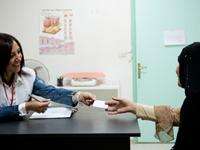Over the past two years, MSF has provided more than 8,000 mental health consultations to Palestinian refugees living in Lebanon's Burj el-Barajneh camp.
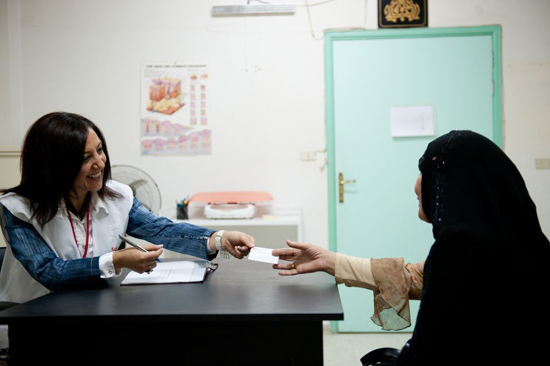
Lebanon 2010 © Dina Debbas
An MSF psychologist and a patient during a consultation in Burj el-Barajneh.
I. Overview:
Since the end of 2008, Doctors Without Borders/Médecins Sans Frontières (MSF) has been running a mental health program for vulnerable Palestinian refugees living in and around Burj el-Barajneh camp, in southern Beirut. Over the past two years, more than 1,000 people have received more than 8,000 consultations in the program, which is based on a community approach that brings together psychiatric and psychological care with social and community support.
Decades after they were forced to leave their homes, millions of Palestinian refugees still live in camps across the Middle East, seemingly facing a future of unending exile.* Of the more than 200,000 registered Palestinian refugees in Lebanon, about half live in a dozen camps dotted around the country. Roughly 60 percent are unemployed and a similar number live below the poverty line, according to figures from the United Nations Relief and Works Agency (UNRWA), which oversees their welfare.
Squeezed between the airport and Beirut’s southern suburbs, Burj el-Barajneh camp is the capital’s most densely populated area, a place where some 18,000 people live in a single square kilometer. Originally set up by the League of Red Cross Societies, Burj el-Barajneh’s population kept growing as families expanded and new inhabitants—migrants from elsewhere in Lebanon and refugees from Syria, Egypt and Iraq—arrived.
Precarious Living Conditions
According to a national survey published in The Lancet medical journal in 2006, mental disorders are no more common in Lebanon than they are in Western Europe. But the number of people not receiving treatment is far higher in Lebanon than in the West. The Lebanese health care system is dominated by the private sector; treatment is expensive. Mental healthcare is available mainly for children. Adults can rarely access the treatment they need. And the picture is especially dire for refugees.
In Lebanon, Palestinian refugees have no legal protection because the Lebanese state refused to sign the 1951 Convention Relating to the Status of Refugees. Palestinian refugees are banned by law from practicing more than 20 professions, including medicine, law, and engineering. Their social and civic rights are non-existent and their access to public health services and education is limited. The vast majority rely on UNRWA for education, health, and social services.
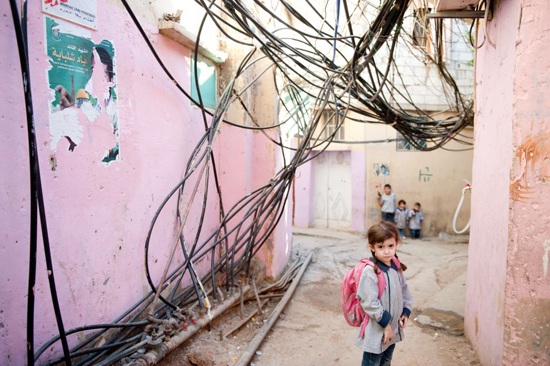
Lebanon 2010 © Dina Debbas
A young girl walks the barren, jury-rigged alleyways on the way home from school.
During the 2006 war in Lebanon, MSF discovered that one in six people in the country was in need of psychological care. That war, and the civil wars that wracked the country in the 1980s and 1990s, are in the past now, but the effects still linger. And many of the troubling factors still exist as well. For instance, in Burj el-Barajneh, water and power are available for only a few hours a day. Despite the water shortages, alleyways are often flooded because inadequate drainage systems mean that excess water from tanks and rooftops sits stagnant in the streets. Tangled skeins of electric cables hang between buildings, and the average room is shared by four people. Rain in the winter and scorching heat in the summer add to the problems.
According to Fabio Forgione, MSF’s head of mission in Lebanon, “Precarious living conditions make daily life a struggle in Burj el-Barajneh, the main reason being that Burj el-Barajneh is one of the most densely populated and deprived camps in Lebanon. Although there have been slight improvements in terms of working opportunities, since a law decree approved by the Lebanese Parliament [last August], general conditions for Palestinian refugees in Lebanon remain deplorable. Policies still applied towards the Palestinian refugee community are restrictive in terms of access to health, education, employment, social services, and property ownership. All of this has a serious impact on people’s emotional stability, and there is a huge demand for psychological support.”
For residents, the stress of living in these surroundings engenders and compounds feelings of trauma and isolation. “Social exclusion, coupled with the extremely poor living conditions experienced by its residents, remarkably increases the degree of precariousness, exposing many refugees to a dire, traumatic, and discouraging daily life,” Forgione says. “MSF’s operational decision specifically to target the adult population is based on the exposure of this population to past and repeated traumatic experiences of conflict and displacement, on the denial of their basic rights, and on their struggle to cope with the permanent nature of what should be a temporary situation. This is why the multi-disciplinary approach of the MSF team has made, and continues to make, a difference: besides the delivery of mental healthcare, the MSF team is engaged in identifying social, legal and economic support among a broad network of partner organizations, which can enable patients to tackle the root causes of their burden of suffering. ”
A Community-Based Approach
MSF’s community-based mental health program is the only service of its kind that offers free consultations in the refugee camp and its vicinity. Counseling is also provided inside the facilities of the main health providers in the camp: the Palestinian Red Crescent Society and UNRWA.
A team made up of international, Lebanese, and Palestinian staff members is providing psychological, psychiatric, and social support to the most vulnerable people, regardless of their gender, nationality, or religious and political convictions. By breaking the taboos associated with mental health issues, giving individuals support, and lending them a sympathetic ear, the counselors are gradually making people feel more comfortable discussing issues that are affecting them. This applies to women in particular; of the more than 1,000 patients MSF worked with in 2009 and 2010, some 60 percent were Palestinian and Lebanese women between the ages of 25 and 40. And, overall, twice as many people sought counseling in 2010 as had in 2009, suggesting that efforts to communicate about the importance of mental healthcare are making an impact.
There is clearly a need. Depression is common in the camp, affecting almost one-third of the patients MSF staff have seen. Another 22 percent are dealing with anxiety, while psychosis affects 14 percent of patients and bipolar and personality disorders impact another 10 percent.
“MSF always tries to set up a community-based and multi-disciplinary approach,” says Pierre Bastin, MSF’s mental health advisor in Geneva. “This means that we do not limit ourselves to prescribing drugs, but try to provide comprehensive bio-psycho-social care. We like using this model. As the factors behind the illness are of a biological, psychological, and social nature, so the treatment must also address these three issues. In practical terms, this means that the biological factor will be treated with drugs by the psychiatrist, and the psychological aspect will be treated by the psychologist working with the patient and possibly relatives. As for the social side, there are also social conditions that must be addressed to help the patient improve.”
Good mental health is the cornerstone of individual and communal well-being. MSF’s medical teams offer care and social support through home visits as well as consultations in its consultation rooms and clinic. Visits to the specialized mental health clinic are increasing, while MSF also ensures that mental healthcare forms part of the primary health care on offer in medical facilities throughout the camp. This approach is helping to spread the idea that good mental health is an essential part of general physical health because of its influence on the way people behave, perceive the world, and interact with others.
II. Patient Stories
Hakim: “Living Conditions Here Are Very Difficult”
“I am a Lebanese of Palestinian origin. I was naturalized in 1948. I am divorced and have two daughters from my previous marriage. They both go to school. I moved to the camp three-and-a-half years ago after I lost my job and my financial situation deteriorated.
“Living conditions here are very difficult; I don’t think there’s anyone who finds them tolerable. Houses are overcrowded and built close together. Zinc roofs cause temperatures to rise in the summer and drop sharply in the winter. The infrastructure is nearly non-existent, and there is very little privacy in people’s personal lives, which makes everyone seem short-tempered. Sometimes, when someone says hello, you want to start a fight with them.
“I was introduced to MSF randomly one day at the UNRWA clinic. They were distributing brochures that described the symptoms related to mental health disorders. The brochure said: if you have one of these symptoms, you should consult a therapist. When I read it, I laughed to myself because I realized I had them all. After speaking to the community health worker, she advised me to visit the MSF center and gave me an appointment, so I went. I was deeply shocked and worried at the seriousness of my illness. If I had continued in this condition, without MSF’s help, I might well have gone on to kill myself and my daughters.”
Ahmed and Itaf: “I’m Not at Home; I’m a Guest”
Twenty years ago, when she first moved in, Itaf, now 54, could see the airport from her house. Today it is no longer visible because the view is blocked by buildings that compete for space in densely-packed Burj el-Barajneh. Houses grow ever taller, as extra stories are added to ease the overcrowding below and the expanding suburbs of Beirut continue to encroach on the camp’s borders.
Itaf lives here with her 72-year-old husband, Ahmed, and she tells the story of how he arrived here more than 60 years ago:
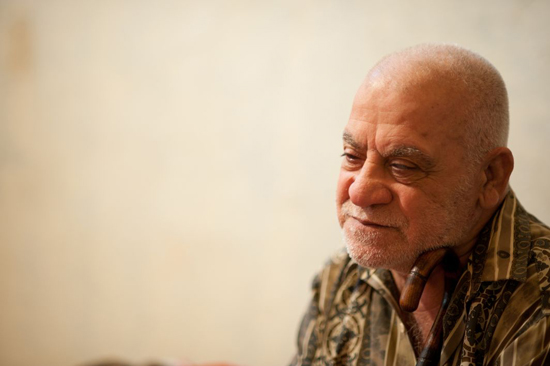
Lebanon 2010 © Dina Debbas
Ahmed Loubani, 72, who has lived in the camp for 50 years but still can't call it home.
“Ahmed left Palestine on May 15, 1948, when he was just 10. After a long journey, with many stops and starts, he arrived in Tripoli and moved into a tent. Later he came to Burj el-Barajneh, where there was again a tent, provided by a UN agency. Now it’s all different. A house has been built and floors have been added so that my sons could live here too. The one-story house is a tall building now.”
Despite the extra space, living conditions are still basic, she says. “We have electricity for only a few hours a day. We have constant power cuts and the water is salty, but it’s all that we’ve got.”
Itaf and Ahmed’s extended family now includes some 50 people, not all of whom have stayed in the camp. One of their sons was killed during fighting in 1987.
“My house is your house,” Ahmed says when visitors arrive. He recently lost his sight, a result of a cataract. He used to work in a petrol station but now relies on social handouts. For the past two years he has also been receiving support from an MSF psychiatrist.
Itaf describes how Ahmed’s behavior changed over time: “He was a quiet man before, but he became very aggressive and he could not endure anything—the shouts of children, the laughter of neighbors, the noise of mopeds… He was shouting for no apparent reason. He was smashing furniture in anger. He was a nuisance to relatives and neighbors. He had headaches. He even tried to commit suicide.”
The mental health support Ahmed has been receiving has helped him cope with his psychological pain. He has returned to his former self, quiet, with a broad, gentle smile. “Here, in this camp,” he says, “I’m not at home; I’m a guest. I used to like the good things in life. I loved life. I danced with my wife at every opportunity, especially at weddings, and I loved to sing.” He adds wistfully, “I would so love to return to Palestine, if only it were possible.”
Yassin: “Life? Which Life Do You Mean?”
“I have just come back from my visit to the physiotherapist,” says 67-year old Yassin. “A small local organization is paying for my treatment here. I still have problems with my hip. I was wounded in an Israeli bombardment from the sea. It was in 1982, but I can remember every detail of that day: the dead, the wounded, the heads on the ground. We didn’t think it would be possible, that they would attack us from the sea. We knew bombs would be dropped, but we didn’t know when or from where.
“Then the attack started, with shells exploding. I can’t help remembering the mutilated bodies of my friends, the blood, the smell. It’s still all there, in my head. I got pieces of shrapnel in my knee, my ankle, my hip. Today I don’t work; I survive thanks to support because I am disabled. Life in this camp is like smoldering tar.
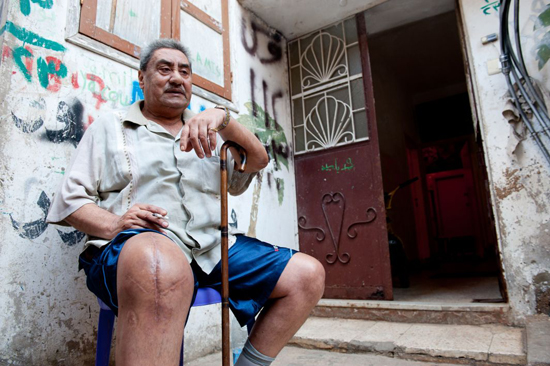
Lebanon 2010 © Dina Debbas
Camp resident Yassin.
“Life… which life do you mean? Everyone knows this life! Young people are in the street, without work. Life is very expensive. We borrow from each other. I left Palestine when I was 11. In Palestine, olives are the source of all that is good. I have a farm there; I still have the deeds for my land and my fields. I was rich… We would like to return to Palestine, even if we have to go barefoot.”
*There are 4.7 million Palestinian refugees registered with UNRWA. According to the United Nations, Palestinian refugees are those who lived in Palestine under the British mandate but lost their homes and livelihoods as a result of the 1948 Arab-Israeli conflict, as well as their descendants.
